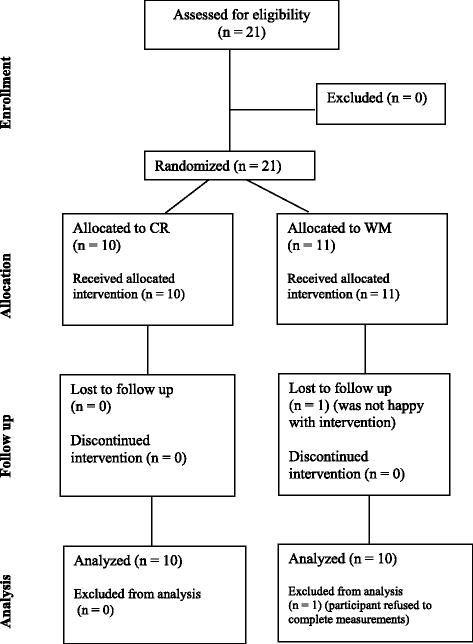Effects of a parallel-arm randomized controlled weight loss pilot study on biological and psychosocial parameters of overweight and obese breast cancer survivors
- PMID: 28702218
- PMCID: PMC5504770
- DOI: 10.1186/s40814-017-0160-9
Effects of a parallel-arm randomized controlled weight loss pilot study on biological and psychosocial parameters of overweight and obese breast cancer survivors
Erratum in
-
Erratum to: Pilot and Feasibility Studies, Vol. 4.Pilot Feasibility Stud. 2017 Oct 24;3:48. doi: 10.1186/s40814-017-0183-2. eCollection 2017. Pilot Feasibility Stud. 2017. PMID: 29123916 Free PMC article.
Abstract
Background: Weight gain often occurs after breast cancer (BC) diagnosis and obesity along with sedentary behavior are associated with increased risk of BC recurrence and mortality. The primary objective of this study was to determine whether a significant weight loss, of approximately 10%, would lead to beneficial changes in biomarkers associated with cancer and/or cancer recurrence, and quality of life (QOL) in overweight and obese BC survivors.
Methods: This parallel-arm study took place in Minneapolis, Minnesota, from January 2009 until March 2010. Participants were overweight and obese postmenopausal BC survivors who had completed treatment at least 3 months prior to enrollment and who did not smoke. Twenty-one BC survivors were randomized, via a random number generator computer software, to a 1000-calorie deficit feeding and exercise intervention (CR) or a weight management counseling intervention (WM) for 12 weeks followed by a 6-week follow-up. Body weight, biomarkers, and QOL were measured at baseline, weeks 6, 12, and 18. Body composition and fitness level were measured at only two time points.
Results: Twenty-one women were enrolled into the study and 20 completed all time points. Weight loss occurred with both interventions. Body weight in CR changed from 85.5 (95% confidence interval (CI) 77, 94) kg to 76.7 (95% CI 68.1, 85.2) kg, whereas in WM it changed from 98.3 (95% CI 89.8, 106.8) kg to 93.2 (95% CI 84.6, 101.7) kg. Fitness in CR changed from 4.9 (95% CI 4, 5.8) to 6.3 (95% CI 5.4, 7.2). CR led to lower plasma levels of leptin, F2-isoprostanes, and CRP. Quality of life seemed to improve with both interventions, while sleep quality decreased only in CR.
Conclusions: Overweight and obese BC survivors were able to adhere to a strict diet and exercise program, which significantly decreased body weight, increased fitness level, and improved biomarkers and QOL. However, the strict dietary intervention in CR seemed to decrease participants' sleep quality and social relationships. Future larger randomized controlled trials should focus on behavioral modification and personalized nutrition counseling to help breast cancer survivors achieve a sustainable weight loss and fitness level.
Trial registration: ClinicalTrials.gov identifier: NCT02940470.
Keywords: Breast cancer; Diet; Obesity; Physical activity; Survivorship; Weight loss.
Conflict of interest statement
Competing interests
The authors declare that they have no competing interests.
Consent for publication
Not applicable.
Ethics approval and consent to participate
This study was approved by the University of Minnesota Institutional Review Board (IRB#0807 M39681) and the University of Minnesota Cancer Protocol Review Committee (CPRC# 2008NTLS107). Written informed consent was obtained from all participants prior to beginning any study activities. This study was registered by ClinicalTrials.gov Identifier: NCT02940470.
Publisher’s Note
Springer Nature remains neutral with regard to jurisdictional claims in published maps and institutional affiliations.
Figures
References
-
- Howlader N, Noone AM, Krapcho M, Miller D, Bishop K, Altekruse SF, Kosary CL, Howlader N, Noone AM, Krapcho M, Miller D, Bishop K, Altekruse SF, Kosary CL, Yu M, Ruhl J, Tatalovich Z, Mariotto A, Lewis DR, Chen HS, Feuer EJ, Cronin KA. SEER Cancer Statistics Review, 1975-2013. Bethesda, MD: National Cancer Institute; 2016.
-
- Demark-Wahnefried W, Peterson BL, Winer EP, Marks L, Aziz N, Marcom PK, Blackwell K, Rimer BK. Changes in weight, body composition, and factors influencing energy balance among premenopausal breast cancer patients receiving adjuvant chemotherapy. J Clin Oncol. 2001;19:2381–2389. doi: 10.1200/JCO.2001.19.9.2381. - DOI - PubMed
Associated data
Grants and funding
LinkOut - more resources
Full Text Sources
Other Literature Sources
Medical
Research Materials
Miscellaneous


